Building resilience in kids is a hot topic.
Intellectually, we all want our kids to be able to cope with the challenges of everyday life and of course be able to bounce back from disappointment. But when we are met with our child’s downcast face or even tears, our best intentions seem to melt away.
We get carried away by the moment and we jump in and try to make them feel better and fix their problems. Unfortunately, that is not what our kids need from us.
What they need are some encouragement and empathy. When we respond in this way we teach kids that they can handle frustration and disappointment on their own. In other words, we help them develop a resilient mindset.
This is how it works. If your child says:
“I can’t tie my shoes!”
Don’t try to fix it: “We got to get you some shoes with velcro.”
Don’t try to make him feel better: “Don’t you worry about a thing, let’s go get some ice cream…”
Don’t try to save him: “Come here, I will do it for you…”
Instead, try the following:
Empathize by just listening and reflecting: “You sound frustrated.”
Give them their wishes in fantasy: “You are wishing tying your shoes was not so tricky and didn’t take so long.”
Empathize and gently ask them about their plans: “Being frustrated is rough. How do you plan on learning to tie your shoes?”
Here is another example:
If your child says:
“I have nothing to wear!”
Don’t try to fix it. Instead, try responding with: “Here, let’s look in your closet and see if we can find something!”
Don’t try to make her feel better: “You look great in everything. Just choose something and it will be fine.”
Don’t try to save her: “I will take you shopping tomorrow and we can pick out some nice outfits for you…”
Instead, try the following:
Empathize by listening and reflecting on their feelings: “You sound like you had a rough time figuring out what to wear.”
Give them their wishes in fantasy: “You wish you had a closet full of clothes..”
Empathize and ask her what her plan is: “You sound annoyed, what are you going to do?”
When we respond in this way, we show our children that we care. More importantly, we demonstrate that we have faith in their ability to take care of themselves and solve their everyday problems with a little encouragement and empathy.



